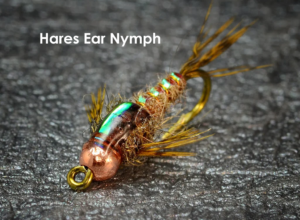Gold Bead Hare’s Ear Nymph – A versatile and effective fly pattern that imitates a variety of nymphs, including mayflies, caddis and small stoneflies. This fly is just plain buggy…and fish cannot resist it. Here is a comprehensive guide on how to tie this nymph.
Step-by-Step Instructions
Step 1: Prepare the Hook and Bead
Start by placing a gold bead onto the hook. The bead should rest at the hook eye.
Secure the hook in the vise and wrap 10 to 12 turns of .010 lead-free wire around the shank to add additional weight. Push the lead up into the bead to secure the bead.
Step 2: Attach the Thread
Begin wrapping the olive or brown 6/0 thread behind the bead and over the lead-free wire to secure it in place
Step 3: Create the Tail
Select several pheasant-tail fibers, align their tips prior to pulling off , and strip them from the stem. Trim any curly ends
Tie the pheasant-tail fibers at the bend of the hook to form the tail, ensuring they are evenly distributed
Step 4: Add the Rib
Cut an 8 to 10-inch length of gold Ultra Wire and tie it in at the base of the tail. This will be used later to rib the fly
Step 5: Form the Abdomen
Create a dubbing blend using hare’s mask and rabbit-fur. This mix should be spiky and well-marked
Dub the thread with this blend and wrap it forward to form the abdomen, stopping just behind the bead
Step 6: Rib the Fly
Wrap the gold Ultra Wire in even, open turns over the dubbed abdomen to create a ribbed effect. Secure the wire and trim any excess
Step 7: Create the Wingcase and Thorax
Tie in another bunch of 10-12 pheasant-tail fibers or turkey fibers at the point where the abdomen ends. These fibers will form the wingcase
Dub more of the hare’s mask and rabbit-fur blend onto the thread and wrap it to form the thorax, which should be bulkier than the abdomen
Step 8: Finish the Wingcase
Pull the pheasant-tail fibers over the thorax to form the wingcase and secure them just behind the bead. Trim any excess fibers
Optionally, coat the wingcase with UV Clear Fly Finish or head cement to add durability and a glossy finish
Step 9: Final Touches
Use a bit of velcro to rough up the body, making the fly’s guard hairs stand out and giving it a more natural appearance
Whip finish the thread behind the bead and trim any excess
Customization
By using different colors of pheasant tail, rabbit fur dubbing, and hare’s mask guard hairs, you can create flies that more closely resemble the natural insects in your fishing area. To make a flashback, tie in some flash prior to tying in the wing case. After pulling the wing case forward, pull the flash forward to form a wing case with some flash as well.
- Hook: Standard nymph hook # 8-16
- Tying thread: Sheer 14/0 Brown
- Tail: Pheasant tail fibres
- Rib: Bright copper wire
- Abdomen: Pheasant tail fibres
- Wing case: Peasant tail fibres
- Thorax: Peacock herl
- Legs: Pheasant tail fibres
- Variations include adding a bead, adding flash to the wing case

